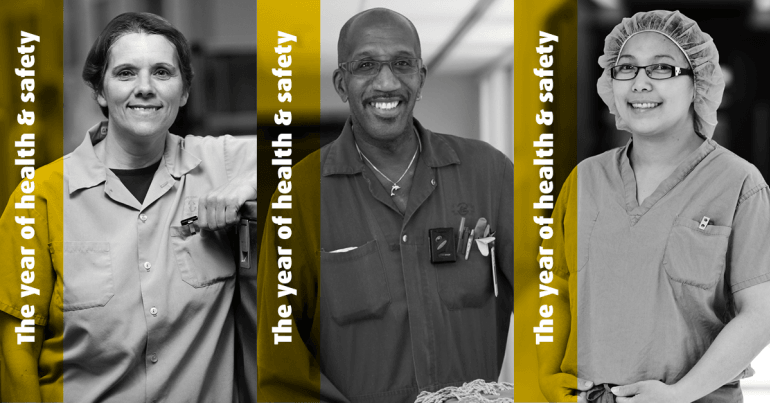 As part of CUPE’s Year of Health and Safety, each month a new profile will be published on cupe.ca highlighting the work of CUPE’s health and safety activists, celebrating health and safety victories, and discussing health and safety resources available to members and locals.
As part of CUPE’s Year of Health and Safety, each month a new profile will be published on cupe.ca highlighting the work of CUPE’s health and safety activists, celebrating health and safety victories, and discussing health and safety resources available to members and locals.
“I made a commitment to do something positive with our love for Tim” explains Shirley Hickman a grieving mother who lost her son Tim in a tragic workplace incident in 1996. Tim was a member of CUPE 739, working for the City of London at the Silverwoods arena part-time. He died days after being severely injured when the arena’s ice resurfacing machine exploded.
“When Tim died we were walking in this fog of grief and shock and navigating a system we didn’t know anything about. Our friends and our community carried us through that first six months.” Hickman describes her experience with the Ontario Ministry of Labour as one that leaves families and the deceased or critically injured with no voice. She found the system focused on laying charges for infractions against the Occupational Health and Safety Act, and not necessarily on supporting the families and victims of workplace incidents.
 “While working through the legal system, a crown attorney let me know that there was a widow in Windsor who wanted to speak with me. So I reached out to her over the phone that evening. We laughed, cried, shared stories of her husband and stories of Tim. Not about what happened, but who they were, and who they were to our families.
“While working through the legal system, a crown attorney let me know that there was a widow in Windsor who wanted to speak with me. So I reached out to her over the phone that evening. We laughed, cried, shared stories of her husband and stories of Tim. Not about what happened, but who they were, and who they were to our families.
“I learned that night that one human being can make a difference. And one by one, families started reaching out to me. They reached out themselves, through the crown attorney, through the ministry, through the London Free Press, etc. It became evident that the families living with life altering injuries, occupational diseases, and those living with the loss from fatal injuries all have common needs–the need to reach out to others and the need to speak and be part of prevention.”
Following that experience, in 2003 Hickman, along with Paul Kells and Sharon Peat created Threads of Life, a non-profit organization with the goal of helping families heal through a community of support. They also advocate for the elimination of life-altering workplace injuries, illnesses and deaths.
It didn’t take long to get going. Starting with a small base, Threads of Life now serves over 2300 Canadian families, offering guides to connect families through their network, links to professional support, advisory support on workplace investigations, and more.
“Threads of Life provides that one-on-one peer support” says Hickman. “We can assure them that when they’re frustrated with the investigation process, every other family has been frustrated and that they’re not alone.”
Threads of Life also has a speaker’s bureau. They keep a roster of family members who have lived through a workplace tragedy, who volunteer to tell their stories at conferences, workplace safety meetings, Day of Mourning ceremonies, and other events. It’s another way to honour their lost loved ones and help prevent future incidents.
Despite the fast growth of Threads of Life, Hickman believes they can still do more. “We know that we’re still missing a lot of the families that could benefit from talking to another family member, or by having information on how to cope with the system.”
 That’s why Threads of Life uses multiple approaches to raising awareness. On the Day of Mourning in 2011, the organization published Forget Me Not—Canadian Stories of Workplace Tragedy from the Families’ Perspective. The book tells the story of 21 families affected by workplace incidents written to be used by health and safety professionals and as a tool for prevention.
That’s why Threads of Life uses multiple approaches to raising awareness. On the Day of Mourning in 2011, the organization published Forget Me Not—Canadian Stories of Workplace Tragedy from the Families’ Perspective. The book tells the story of 21 families affected by workplace incidents written to be used by health and safety professionals and as a tool for prevention.
They also organize Steps for Life, an annual walk to promote awareness and prevention of workplace health and safety incidents. Walks take place in many communities across the country, usually around the end of April.
Individuals and organizations can donate to the cause through the Threads of Life website, or by hosting fundraisers of their own, such as BBQs. For more information visit threadsoflife.ca or stepsforlife.ca, and don’t forget to sign up for their newsletter!


